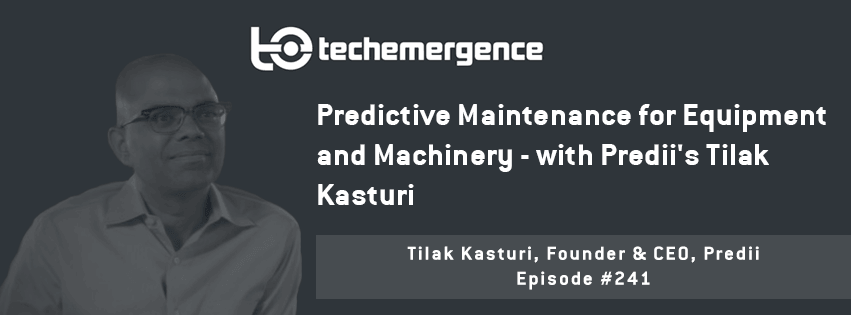
It would be great if instead of having our car break down – could have them fixed as soon as the underlying problem began. It would be great if instead of having to diagnose a malfunctioning piece of mechanical equipment – would could have the right “fix” presented to us immediately. As it turns out, artificial intelligence may be working its way to accomplish both of those goals in the not-so-distant future.
This week we interview Tilak Kasturi, CEO of Predii, a predictive maintenance AI company based on Palo Alto. Predii focuses on helping service people by using AI and sensor data to prescribe proper repairs. In this episode, Tilak speaks with us about what’s currently possible within the world of “predictive maintenance,” as well as the possible ramifications of industrial IoT and AI in the next 5 years.
Guest: Tilak Kasturi, CEO at Predii
Expertise: Data-driven enterprise tech, AI in automotive and heavy industry
Brief recognition: Tilak has worked in technology in a variety of roles since 2000. His previous company – Radion, Inc – was acquired by San Jose-based Xoft corporation in 2014, and he co-founded Predii in 2013. He holds a Masters degree in computer science from the Florida Institute of Technology, and an MBA from the University of Central Florida.
Big Idea
Service professionals in the future may not have to “re-invent the wheel” in diagnosing and repairing their equipment. Sensors and AI might detect consistent patterns that predict breakdowns, and prescribe the right fixes in real time.
Companies that collect sufficient data from a large number of machines will have the power the predict issues and suggest fixes. For this reason, the companies most likely to benefit form predictive big data applications in the near term will be large firms with a huge number of machines. A shipping company with 2,000 trucks has the ability to find the patterns that lead to different kinds of breakdowns and fixes – especially if those trucks are the same make and model.
Once large firms are able to determine patterns and suggest fixes and maintenance, this predictive ability will be able to be licensed to smaller firms (a shipping company with only 6 trucks, for example) who would never have the ability to make those predictions based on their own smaller data sets. This creates a potentially interesting “winner takes all” dynamic that makes AI an appealing business model. This “winner takes all” dynamic is covered in greater depth in our extremely popular investor interview with VC Gary Swart of Polaris Partners.
(For readers with a strong interest in mechanical and robotic applications of AI, please see our full article on machine learning and AI in robotics.)
Interview Highlights with Predii’s Tilak Kasturi
Navigate to the listed times in the interview above to see Tilak’s answers to the questions in this week’s interview:
- (3:00) Where is predictive maintenance used in industry today?
- (7:55) Give us an example of how a machinery maintenance tool might “hook up to the cloud” to help improve the maintenance process in the real world.
- (16:30) How could a company build and draw from their own “pool” of data, in order to actually apply predictive analytics?
- (19:30) When you look ahead in the next 5 years, what industries are most likely to make predictive maintenance into a regular part of how they do business?
Related Interviews on Emerj
Our goal at Emerj is to be the #1 source for business and government leaders to learn about the practical applications of AI in their organization. We call it “staying on the right side of disruption,” making the right strategic plans and being prepared to use (or deal with) the technologies that will disrupt important industries and business functions.
Interviews with top executives and experts is part of what lets us help our readers “see around corners” and get a sense of the trends that matter. Each week, our AI in Industry Podcast (all episodes here) brings on a new AI executive or researcher to explain the applications and implications of AI in their domain of expertise.
If you’ve enjoyed today’s episode, you might enjoy some of our other “heavy industry”-oriented interviews, including:











